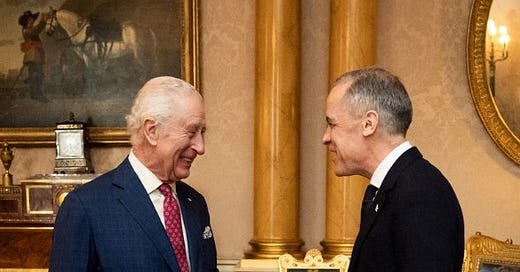Mark Carney's Globalist Instincts and the Canada-First Divide
Globalism Versus National Priorities
Mark Carney's ascent to Canada's highest political office has reignited debates about his globalist leanings and technocratic approach, raising sharp concerns about his dedication to Canada's national interests. With high-profile roles at Goldman Sachs, the Bank of Canada, and the Bank of England, Carney exemplifies the archetype of a globe-trotting financial elite. Yet, critics argue this international pedigree distances him from Canada’s urgent economic realities
Globalism Versus National Priorities
Carney's résumé underscores his integration into global finance. After his tenure at Goldman Sachs and two of the world's most influential central banks, Carney took on the role of UN Special Envoy for Climate Action and Finance, championing net-zero emissions. While globally admired, these policies clash with the interests of Canada's resource-driven economy, particularly in the oil, gas, and mining sectors.
Critics contend that Carney’s global engagements often overshadow pressing national concerns. His alignment with international climate agendas may place Canadian workers and industries at a disadvantage, prompting ongoing questions about where his loyalties ultimately lie.
European Focus, North American Blind Spot
Carney, many argue, is sticking to his comfort zone: cultivating relationships with European elites. Yet, even as he courts Old World capitals, Canada’s geopolitical reality is rooted in North America. The U.S.—under the assertive leadership of President Donald Trump—is reshaping trade, security, and continental defense priorities.
While Carney circles Davos and the boardrooms of Paris and London, Trump is doubling down on national security, border enforcement, and cracking down on transnational crime. By focusing on Europe instead of retooling Canada’s North American partnerships, Carney risks leaving the country underprepared for the region's emerging geopolitical realities.
His decision to prioritize European diplomacy following his Liberal leadership win, while Canada grapples with inflation, a housing crisis, and an underfunded military, has been widely criticized as tone-deaf.
Carney's Silence on Critical Continental Issues
Beyond optics, Carney has remained largely silent on core North American issues, such as the fentanyl epidemic, cartel activity at the U.S.-Canada border, and Canada’s underwhelming contributions to NORAD modernization. Meanwhile, President Trump has made North American security a cornerstone of his administration.
Critics argue Carney’s reluctance to engage fully with these challenges signals a deeper misalignment with the country’s most immediate strategic priorities.
A Familiar Pattern: The Royalty Complex
Observers have drawn parallels between Carney’s behavior and that of Prime Minister Justin Trudeau, noting a shared tendency toward defensiveness and a sense of entitlement when confronted with criticism.
Trudeau’s dismissive reactions to the SNC-Lavalin scandal and the Aga Khan vacation affair are emblematic. Likewise, Carney’s infamous “Are you serious?” retort to reporters questioning his financial entanglements with Brookfield Asset Management reflected a similar unwillingness to accept public accountability. This defensiveness seems to reject public accountability and deflect public criticism as somehow acceptable. Both Carney and Trudeau appear to exhibit a lofty reflexive doubling-down when challenged, regardless of growing public dissatisfaction or adverse outcomes. Indeed, the royalty complex warrants further exploration, and is especially illuminating given that Mark Carney visited the King of England yesterday.
Yesterday’s polls indicates that Pierre Poilievre continues to outpace Carney on key domestic issues. Poilievre holds leads on affordability, fiscal discipline, and national defense—issues voters increasingly prioritize. Although polls fluctuate, the data underscores growing skepticism toward Carney’s technocratic, globalist approach, and highlights Poilievre’s resonance with Canadians seeking immediate, practical solutions.
Poilievre: The Canada-First Alternative
Unlike Carney, Pierre Poilievre has positioned himself squarely as a champion of Canadian sovereignty. His platform prioritizes domestic prosperity and a renewed focus on the U.S.-Canada partnership.
Poilievre’s agenda includes repealing carbon taxes to alleviate the cost-of-living crisis, fast-tracking housing construction, restoring fiscal discipline through balanced budgets, and increasing contributions to NORAD and continental security.
Crucially, Poilievre operates free from Carney’s international entanglements, presenting himself as the clear alternative who can stand firm at the North American negotiating table. Many Canadians see him as the leader who would treat President Trump as a key—albeit complex—ally, while vigorously defending Canadian economic and security interests.
The Crossroads for Canada
Carney’s rise exposes the tension between a globalist vision and national stewardship. As economic pressures mount at home and security threats escalate across North America, Canadians must decide whether Carney’s internationalist instincts or Poilievre’s domestic-first approach better serves the nation.
With Canada’s prosperity and sovereignty at stake, the choice between these two contrasting leadership models has never been clearer.




